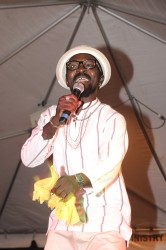By Dacia Whaul
Lester ‘De Professor’ Charles, told ‘the truth’ on Friday night at Demerara Park, and the judges believed him; it earned him the 2014 Mashramani Adult Calypso crown and $600,000.
Roger ‘Young Bill Rogers’ Hinds took the second spot with his piece, “I Ain’t Singing Bout Dat,” while Kenroy ‘Mighty Believer’ Fraser came in third with “Tell Dem Leh Deh Know.” They won $400,000 and $250,000 respectively.
De Professor was the last on stage to loud applause and he soon had the audience gyrating to his calypso, “Is The Truth.”

He sang about the corruption he heard about in the media and urged ‘your honour’ to believe it. “So when ah sing bout the bad contracts and the high tax, the crime rate it climbing to the max, is the truth, ah talking the truth. Government ministers above the law, corruption like never been heard is the truth, ah talking the truth… Your honour as I stand and speak, the security system is very weak, too much crime every single day, sheer thieves and bandits in high brackets, driving to work in tie and jacket, am I wrong your honour, with the things I say?”
Uninvited ‘backup singers’ shouted from the audience, “is de truth” every time he hit the chorus line.
In a telephone interview with Sunday Stabroek yesterday, Charles said that though he had expected to win, he was still very conscious that it could have been anyone’s game. He said that was because he was not as confident as he was in last year’s competition.
He said the song was birthed from the bad reception of his submission to last year’s competition, which had been labelled antigovernment. “It was a special occasion, that I was able to defend my crown successfully” he added. Charles said, his goal is to win next year’s competition and become the first ever to win it three times consecutively, while noting the gravity of the task ahead.
Hinds told this newspaper that he accepted the judges’ decision. However, he declared that what some performed was not calypso. Hinds said some melodies sounded like groovy soca, furthermore, he called for more workshops to be conducted to help those desirous of competing, hone their skills. He said the judges need to be well versed in the art form. In his opinion, judges do make blunders. He added they get carried away with political commentary and the crowd response. Hinds emphatically stated that, calypso is not about blatantly bashing the government of the day or anyone else; it is about creatively writing about one’s feelings.
Hinds said he thought he executed his performance well and thus had expected to win. He praised the support calypso received and competitiveness among the contestants.
Fraser said he too accepted the final decision, however he was disgruntled over the performance of the band. He said mistakes were made with the melody while he was performing. “It broke my morale,” he said. He added that the limited rehearsal time afforded to him and others, played a part in him placing third.
Calypso supporters were out in their numbers; both the matured and the youth alike braved the threatening weather as well as a few passing showers to cheer on the valiant competitors.
Calypsonians were judged on how well they adhered to their topic, explored and developed their composition and the construction of the song out of 30 points. In terms of melody, the originality and how well the melody and lyrics meshed could have earned them as many as 30 points.
As regards rendition, clarity and pronunciation of words being sung and the ability to stay in tune throughout the performance would have earned another 30 points.
Meanwhile, in terms of presentation, the ability to perform and whether the contestants’ attire enhanced it scored 0 points.
There were eight judges, led by media personality Enrico Woolford, whose job was to remove the highest and lowest scores for all contestants, then tally the remaining scores and present the winner.





